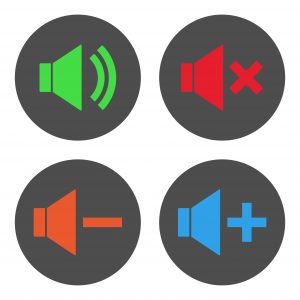It’s an unkind stereotype—the aging person who is constantly saying, “Eh?” because they can’t hear what someone else is saying. While it might make for a funny bit on a TV show or in a movie, in real life, hearing loss is no joking matter. And of course, it’s not only older people who experience hearing loss, it can happen at any age.
Impaired hearing is not only inconvenient and a detriment to quality of life, it can also contribute to physical injury (the inner ear is critical to maintaining balance and avoiding falls) and depression (withdrawal from social situations due to embarrassment can lead to isolation).
If you find yourself starting to have trouble hearing the television or making out conversation in noisy environments, know that you are not alone. About a third of people ages 65 to 74 experience some level of hearing loss. And for the population 75 and older, that percentage increases to about half.
However, there’s good news because there are many things you can do to protect against and offset the effects of hearing loss.
What causes hearing loss?
The type of hearing loss related to aging is called presbycusis, which occurs gradually over time and is attributed primarily to changes in the inner ear and auditory nerve.
According to MedlinePlus, a part of the U.S. National Library of Medicine, there are several factors that are known to contribute to age-related hearing loss:
- Family history (age-related hearing loss tends to run in families)
- Repeated exposure to loud noises
- Smoking (smokers are more likely to have such hearing loss than nonsmokers)
- Certain medical conditions, such as diabetes
- Certain medicines, such as chemotherapy drugs for cancer
Other common causes of hearing issues include certain types of infections, buildups of earwax or fluids, some viruses and bacteria, and more serious health events like strokes, brain injuries, and tumors.
What are common signs of hearing loss?
Age-related hearing loss usually occurs in both ears at the same time, and—as noted above—is progressive in nature rather than sudden. For this reason, many people fail to notice the early signs, and miss out on an early diagnosis that could help in the long run.
In addition to having difficulty hearing other people speak (especially in noisy conditions or over the phone), other indications that you should see a doctor include:
- difficulty tolerating loud noises
- needing to turn up the volume on the television/radio/computer
- an inability to separate foreground and background noises
- a harder time hearing high-pitched sounds (including higher-pitched voices)
- tinnitus (ringing in the ears)
What are the best ways to cope with hearing loss?
There are a number of options when it comes to offsetting the effects of age-related hearing impairment: certain lifestyle changes can help you minimize the day-to-day inconvenience, technology (including hearing aids and other assistive technology) can provide some support, and, there are also surgical treatments.
Lifestyle Tips
Ask for help—One of the hardest things about dealing with hearing loss is thinking you have to do it on your own. Many people are embarrassed, not realizing that it’s a very common part of aging.
Be open about what’s happening. Ask friends and family for help. And, remember small things can make a big difference.
For instance:
-
- Having someone face you while they’re speaking to you can make it much easier to understand what they are saying by picking up on body language, lip movements, and other physical cues.
-
- You can also ask people to speak up and enunciate more clearly, but make sure they understand that you’re not asking them to shout and speak more slowly.
-
- You can reduce background noise by turning off the television while in conversation, and—when you’re out—avoiding noisy locations that make it hard to focus on a conversation amidst a lot of ambient noise.
-
- Turning on the closed captioning option on your television.
-
- Making sure the video and audio on your computer or other device is the best quality.
-
- Using different kinds of smart home technology like devices that provide alerts—like someone being at the front door—via visual and/or tactile notifications instead of only audio ones.
Technology Options
 In the old days, hearing aids were large and conspicuous; but today they can be practically invisible. While most insurance plans (including Medicare) don’t cover the cost of hearing aids, it can still be worth pursuing this solution. There are even some over-the-counter hearing aids, which are regulated just like prescription ones, but offer a lower-cost option.
In the old days, hearing aids were large and conspicuous; but today they can be practically invisible. While most insurance plans (including Medicare) don’t cover the cost of hearing aids, it can still be worth pursuing this solution. There are even some over-the-counter hearing aids, which are regulated just like prescription ones, but offer a lower-cost option.
There are also many varieties when it comes to the style of hearing aids:
-
- In the ear (ITE) — Because this type of hearing aid is placed external to the canal, it’s very visible. This type of aid also tends to be larger. Depending on the type, an ITE hearing aid can be helpful for mild to severe hearing loss.
-
- In the canal (ITC) — These custom-molded aids are typically used for mild to moderate hearing loss and are visible to some extent.
-
- Completely in the canal (CIC) — The most discreet type of hearing aid style, the CIC aid sits completely inside the ear canal, making it almost undetectable. These are used for mild to moderate hearing loss, and tend to have only basic features because they are so small.
-
- Behind the ear (BTE) — These units sit behind the ear and are stabilized and connected to the hearing canal via a small hook over the ear and a tube. BTE aids are appropriate for any level of hearing loss.
-
- Open fit — Similar to a BTE option, an open fit hearing aid sits behind the ear and has a thin tube that acts as a receiver within the ear canal. This style also features an open dome that helps keep the ear canal very open, allowing better reception of low-frequency sounds.
Because hearing aids tend to be quite expensive (on average they start at $1,500 per ear, and can be a lot more than that for higher end models), the Mayo Clinic recommends seeing a doctor to verify the actual cause of your hearing loss, asking about a trial period on the hearing aid, checking the warranty carefully, and planning for the expense.
They also warn about misleading claims that unsavory advertisers may use to influence buying decisions. It is not possible, for instance, for any hearing aid to restore normal hearing or completely eliminate distracting background noise. Any company who promises such things should be suspect.
There are also a number of organizations that help those in financial need acquire hearing aids, including Easter Seals and the Starkey Hearing Foundation.
Surgical and Biotech Solutions
If your hearing loss is caused by damaged nerves or tissue, a more advanced type of solution may be appropriate. There are a number of procedures that are appropriate for older people and can help in these instances.
Here are two of the most common:
- Bone-anchored Hearing Systems – This surgically implanted device bypasses the middle and inner ear, instead making use of the body’s ability to transmit sound through bone. In essence, the device is able to convert sounds into vibrations, which it then transmits to the inner ear.
- Cochlear Implants – This small, electronic device is surgically implanted in the inner ear, which allows it to improve the ability to hear sound by sending sound vibrations directly to the hearing nerve. The sound quality may not be perfect, but the volume will be improved.
 Don’t wait to see what your options are. The first steps to effectively addressing hearing loss are to acknowledge the issue and see a professional.
Don’t wait to see what your options are. The first steps to effectively addressing hearing loss are to acknowledge the issue and see a professional.
As we’ve touched on here, there are many variations to the causes, types, and treatments for hearing loss. Because of all these nuances, it’s smart to seek a professional opinion so that you can define the specifics of your unique situation, and come up with the best possible plan to compensate for the impairment.
Hearing loss is an unfortunate part of growing older for many, many people; but it doesn’t have to lead to more severe issues that affect health and mental well being. Most hearing issues can now be addressed with technology, medical options, or subtle life changes, so there’s no reason to let hearing loss slow you down or affect your quality of life.
Related Posts:
Why Small Talk and Casual Connections Matter
Positive Aging: Why It Matters and Where to Start
How Good is Your Hearing? Find Out With a Phone Call
Technology For Seniors – The Good, The Bad, and The Ugly
Forget Your Reading Glasses? Here’s Your Backup Plan
 Connecticut Estate Planning Attorneys Blog
Connecticut Estate Planning Attorneys Blog



